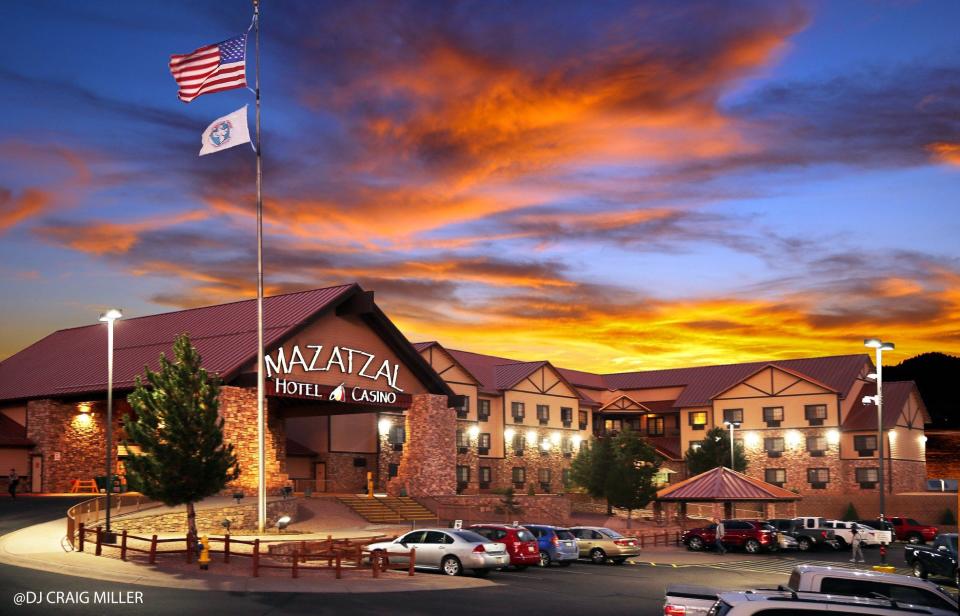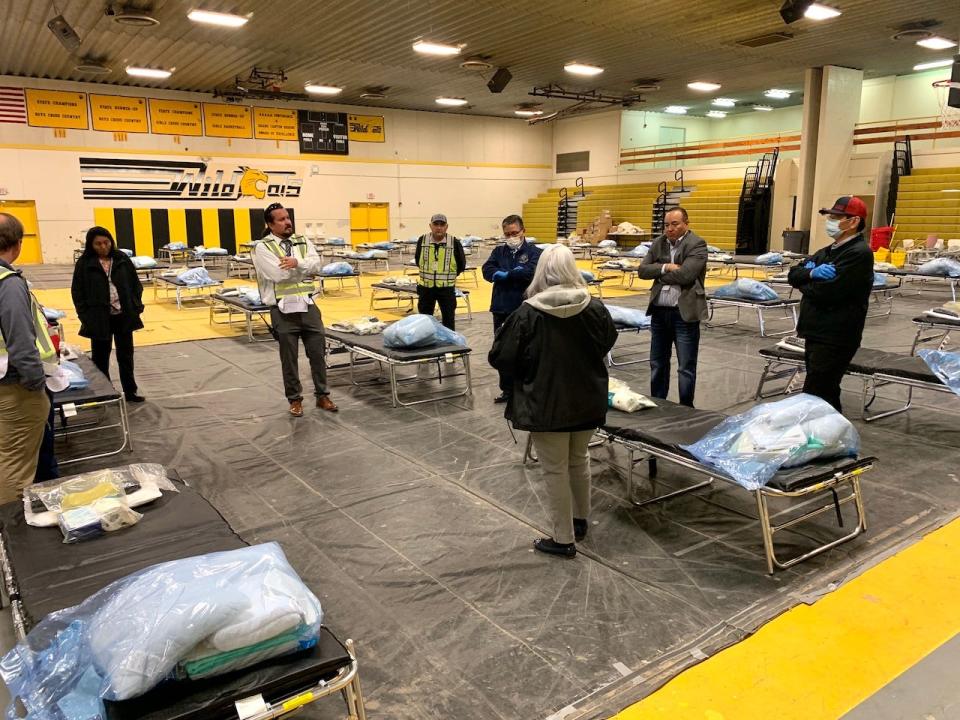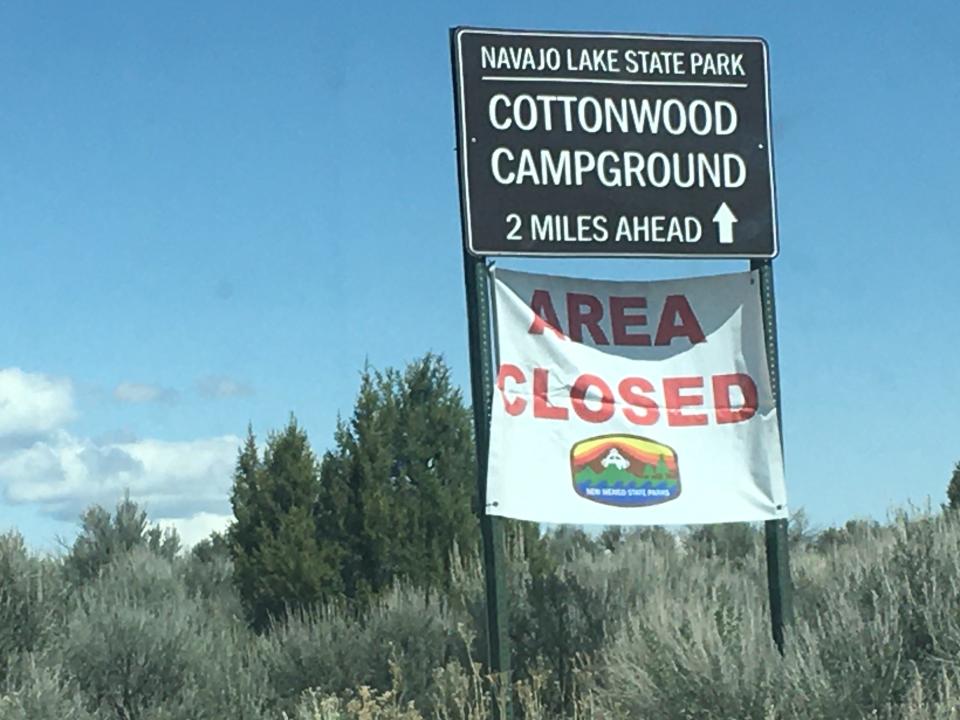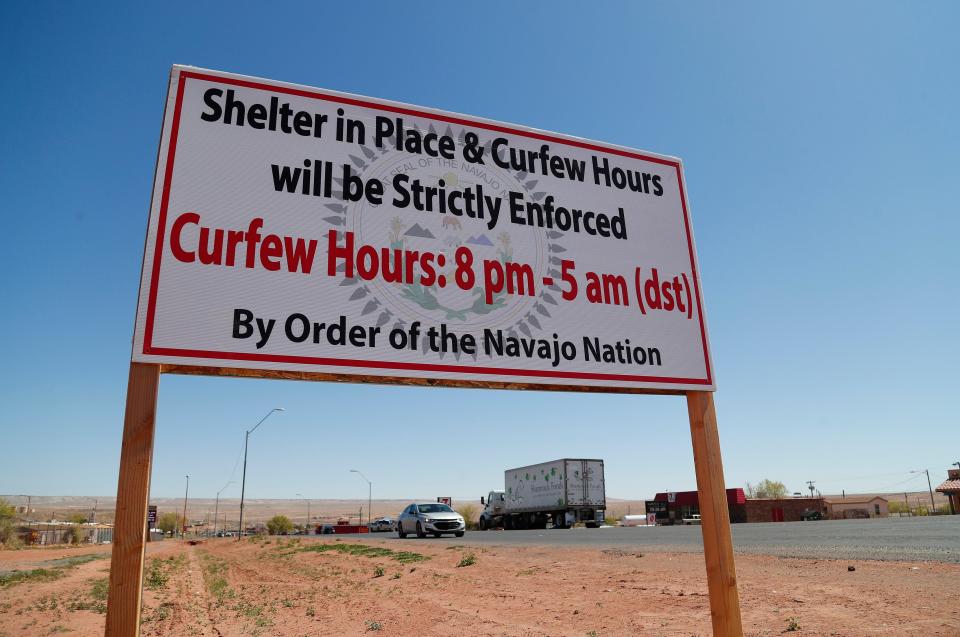Native American tribes have been hit hard by coronavirus, and they're battling red tape to get help
GREAT FALLS, Mont. – Nathaniel Campbell has already dipped into his savings but isn’t sure how much longer his reserves will be able to support him.
Furloughed from the Arizona casino he helps manage, the Tonto Apache Tribe member is putting much of his faith in the federal government.
Campbell and members of Native American tribes across the country are relying on Washington to offer a financial lifeline as they battle the economic and human tolls of the coronavirus pandemic. But despite billions earmarked for tribes, members of Indian Country have been met with red tape, roadblocks and new hurdles that have led to delays and deep-rooted feelings of uncertainty.
Tribes are having to wait for money to funnel through layers of federal agencies before it reaches them. And the agencies tasked with helping them are already chronically underfunded.
Despite language in the legislation meant to allow tribes access to a small business loan program called the Paycheck Protection Program, tribes that rely on income from casinos to function were unable to apply for loans because of what lawmakers say was a drafting error in the legislation. Hours after USA TODAY published this story, the SBA updated guidance allowing tribal casinos access to these loans.
Campbell's tribe in Payson, Arizona, like many Native American tribes across U.S. Indian Country – federally defined areas that encompass Native American communities across the U.S. – have been hit hard by the coronavirus. Social distancing restrictions have decimated incomes from casinos, the financial pain rippling through tribes while the number of infections and deaths skyrocket, reaching grim numbers that outpace some states.
Unlike states and local governments, Indian Country areas are unable to collect taxes, and instead many rely on the income from casinos to pay for everything from their police departments to public health programs that have become crucial in fighting the coronavirus.

“We all knew things were going on in the world with the virus, but when it hits home, and it affects your life and your community, I just thought, ‘Wow this is really big,’” said Campbell, 52, who is now using what money he has in savings to also support his parents.
“We’re doing our best to comply with what has been put in place, practicing social distancing, washing our hands and sheltering in place. But now we need the federal government to step up and say, ‘We will back you up.’ We need them to stop playing these political games with our lives.” .
'Smallpox 2020': Blackfeet Nation fears impact of COVID-19 in Montana
Minorities being hit harder by COVID-19: Black people dying from coronavirus at much higher rates in cities across the USA
Waiting for help as coronavirus deaths mount
The $2 trillion emergency bill passed by Congress in March provided about $10 billion for tribes, including $8 billion for the nation's more than 500 federally recognized tribes themselves and $2 billion for federal agencies tasked with Indian affairs.
But that help hasn’t arrived yet.
Tribes and congressional leaders have outlined issues that have tied up money or made relief harder for tribes to receive them.
For instance, the legislation did not determine how the $8 billion would be disbursed, leaving disagreements on how much each tribe should receive. Some say the money should be divvied up by land size, population or even the number of coronavirus infections.
Opinion: Amid coronavirus hard times, US government must honor its commitments to Native Americans
Parenting in a Pandemic: How this Montana family is caring for 9 kids amid coronavirus
Tribes have also had trouble accessing money at the CDC, and many don’t have prior relationships with the federal agency. They’re having to fill out forms and apply for grants to access money.
“Even though we have this treaty relationship with the government, there’s so much red tape involved in getting dollars to tribal communities,” said Navajo Nation President Jonathan Nez.
The Navajo Nation, which spans more than 17 million acres across portions of Arizona, Utah and New Mexico, has reported about 1,300 COVID-19 cases and 49 deaths – about triple the number of cases in either Montana or Wyoming.
“We shouldn’t be going through these same hoops when we’re facing a public health emergency in Indian Country,” he said. “We have to do what we always do and follow the process. It’s frustrating.”

It’s not just larger tribes like the Navajo Nation feeling the impacts from the virus. Smaller tribes are waiting for help they say may never come.
The Little Shell Tribe of Chippewa Indians of Montana, located in Great Falls, recently gained federal recognition status in December after a generations-long fight. But they don’t have designated land or a federal Indian Health Service (IHS) facility where members can seek medical treatment and have yet to receive any health care funding to combat coronavirus. Without an IHS facility, residents need to drive hours for medical attention.
'I've really been pushing'
A bipartisan group of lawmakers has been working behind the scenes to free up money and fix issues that have plagued tribes, even working their connections in the White House.
Sen. Martha McSally, R-Ariz., said one of the primary concerns has been getting access to CDC money, a problem that stems from tribal organizations like IHS not having established funding relationships with the CDC.
“I've been really pushing on, like, cut the red tape, you know, help these guys get their access that they need,” she said.
She noted that tribes should start to see financial relief trickling in as the Treasury Department is required under law to release the $8 billion by Friday. A Treasury Department spokesperson acknowledged the deadline but said it would not be able to start making payments to tribes by Friday. The spokesperson said the department was still working to properly divide up the funds to ensure those who are eligible receive money quickly.
More: Native Americans find 'escape' from coronavirus fears with basketball
How $2 trillion coronavirus bill helps: COVID-19 stimulus package offers $10 billion for tribes
Sen. Kyrsten Sinema, D-Ariz., had been pressuring the Treasury Department on allowing access for gaming tribes to the small business loan program established in the March stimulus package.
While lawmakers say language was specifically added to allow tribal casinos access to the loans, conflicting language in the legislation led the Small Business Administration to use existing regulations that have barred many gaming operations from accessing the program.
The SBA reversed course on Friday, offering updated guidance that opens the door to tribal casinos. On Thursday, Congress passed an additional $320 billion for the program, which tribes will now have access to.
“It was a mistake, a drafting error,” Sinema explained.
Sinema applauded the change and the financial relief it will offer tribal communities. "I’m glad the Treasury Department and Small Business Administration did the right thing," she said.
McSally called the change a "huge victory" for tribes weathering this crisis.
"Finally. This is a huge victory for our tribal communities and the many tribal and non-tribal employees who rely on tribal gaming enterprises for their livelihood," she said.
'Health disparities are off the charts'
As coronavirus infiltrates communities worldwide, it has exposed inequalities within minority communities, including the more than 5 million people who identify as Native American.
Many live on reservations across the Midwest, in homes without internet, electricity or running water, making washing hands often more difficult. And oftentimes, families live together making it harder to distance from others.
Native Americans also die at much higher rates from tuberculosis and diabetes and suffer from heart conditions at a disproportionate rate compared with the rest of the nation, according to data from the National Congress of American Indians (NCAI).
"When you look at Indian Country, the health disparities are off the charts. There’s high rates of diabetes and heart disease, so if they get infected (with coronavirus), there’s a good chance they’re going to die," said Kevin Allis, CEO of the organization. .
Sen. Tom Udall, D-N.M. and vice chairman of the Senate Committee on Indian Affairs, said Indian Country's long history of issues with getting federal resources has only compounded the problems facing tribes with the coronavirus.
"For Indian Country, the struggle to get their fair share of federal resources has always been a problem. And that's a big reason why tribes are so at risk right now because they have been consistently left behind," Udall said.
Rep. Deb Haaland, a Democrat from New Mexico and one of the first two Native American women elected to Congress, said she believes the lack of money is a result of a lack of knowledge about Indian Country
"Indian Country has been left behind for decades," she said. "This was all Indian land at one time, and now it's the United States of America." Haaland explained that in exchange for the land, the federal government promised to ensure proper "health care, housing, education, and so forth."

The NCAI has said hospitals and centers for tribes are overcrowded and unsafe and have outdated facilities and medical equipment. What funding for care there is doesn’t provide enough for public health and disease prevention programs, NCAI says.
“Appropriations for the IHS have never been adequate to meet basic patient needs, and health care is delivered in mostly third-world conditions,” NCAI said in a budget request for 2020.
This month, the chairman of the San Carlos Apache Tribe wrote to President Donald Trump and Treasury Steven Mnuchin on the implications of excluding them from the small business loan program.
“In all likelihood, without federal assistance for our Casino and Resort, it will go bankrupt, the machines will be returned, the hotel and golf course shuttered, we will lose a brand and market that took over 20 years to develop, our economy will be crippled, we will no longer be able to subsidize federal programs that deliver essential programs that our people depend on,” the letter from chairman Terry Rambler reads.
Some lawmakers note there has not been a huge focus on Native American relations under the Trump administration, which makes it harder to convey the intricacies of tribal life and the needs for these communities.
"There's nobody really around the president that knows this community as well as I would like. I wish somebody did," said Rep. Tom Cole, R-Okla., a Chickasaw Nation citizen. He noted that the Obama administration always had a special adviser on such issues in the White House.
That's not the case with the Trump administration.
"This has not been a huge focus of the administration," Cole noted, adding that Mark Meadows, a former House member now serving as Trump's chief of staff, has been helpful.
The White House pushed back on criticisms that tribal affairs has not been a priority, pointing out the president has hosted tribal leaders at the White House, established a new task force for missing and murdered Native Americans through an executive order and assembled a COVID-19 response team for Indian Country as it battles the virus.
“President Trump continues to advocate for the health and well-being of the Native American community, especially as we fight COVID-19 together,” Judd Deere, White House deputy press secretary, told USA TODAY in a statement for this story. “Previous Administrations were naive to or just didn’t care about the challenges facing this community, and President Trump has directed his staff to engage directly with tribal leadership nationwide to build partnerships around issues of substance in Indian Country and ensure their long-term sustainability for generations to come."

Meanwhile, major voices within the Indian Country community are demanding that the federal government step in to help Native American communities. Cherokee Nation, the largest tribe in the country, notes its 11,000 employees are still receiving full pay and benefits, but the government needs to step in.
“The bottom line is we’ve done everything right. We have been the definition of a responsible employer. We’re the reason why the economy in northeast Oklahoma is not worse than it could be,” said Chuck Hoskin Jr., principal chief of the Cherokee Nation. “Now, we need Congress to do the right thing and honor the great effort we’ve taken.”
Cole said while he knows these communities and has been advocating for tribes, the spread of the virus and the deaths have been difficult on a personal level.
"It's heartbreaking," he said.
Contributing: Deborah Barfield Berry
This article originally appeared on USA TODAY: Coronavirus: Native Americans hit hard as tribes battle red tape

